- Home
- A. S. Byatt
The Virgin in the Garden Page 9
The Virgin in the Garden Read online
Page 9
“Colour and light and movement and sounds and sweet airs, why the hell not,” he said to Alexander. “The land’s sick for it and I mean to go out in a burst of fireworks and a froth of pleasure, leaving behind me one or two enduring monuments, small things and not entirely my own, but touched with my touch, a University, my dear, and your lovely play and a brightened up garden or market square here and there. Then I shall break my rod, if not drown my books, and rest from my labours in my little turret and survey the brand-new students in their little black gowns wandering between my yew hedges in an ornamental manner. I’m afraid there’s been some controversy about the gowns – démodé for a new place, a democratic place – but I believe grace, and a little humouring of my last whims, will prevail.”
He said also, “What it wanted was a Master Plan. To involve a lot of time and a lot of space and a lot of people. I appeal equally to high ideals and base passions. Real culture – sewing as well as glue, barley sugar as well as candy floss, old words, new words, going gracefully together. Also vulgar competition, dear boy. The Best Elizabethan Feast, the Best Old Elizabethan Garden, the best New Elizabethan Garden, the best Village Pageant. And we hold deliberately exhaustive and long-drawn-out auditions for all the musical events and dancing displays and most of all for your play. Like the worst film tycoons we will comb the country for undiscovered talent, peer down the gymslip of every schoolgirl, get the little boys saying they’ll put girdles round the earth and the big ones doing Caliban … We’ll draw everyone in …”
He sat there, small, cherubic, red and shining, his silvery hair floating delicately above his pointed ears, his plump arms circling and circling, miming the drawing-in of everyone. He poured more scotch for Alexander, who had, these days, drunk perpetually a little too much scotch for comfort, and proposed a toast.
“The Golden Age, Alexander. Redeunt Saturnia Regna. It is all boiling and bubbling. I hope and trust and believe.”
Local Festival Committees were set up in towns and villages. Alexander put a great deal of despised charm into persuading Bill Potter to chair the Blesford one, which also included Felicity Wells from the Grammar School and the Vicar, Mr Ellenby. Bill’s contempt for these two persons, combined with his wrathful fear that Crowe was taking over his austere cultural groups with promises of gilded cakes and ale, pulled him both ways. Finally he agreed to join, with a somewhat Trotskyite intention of subverting Crowe’s frivolous values, with Crowe’s money, from within Crowe’s structure. He would see that information was purveyed about the Tudor police state and judicial barbarities, about starving and plague-ridden armies: he would have a torture and execution exhibition in Blesford Ride that would be popular and a highly serious lecture by a political historian that would not, but would be well attended, on the swell of Crowe’s tide of interest and the boys’ morbid curiosity.
The Festival Committees visited schools and colleges, eliciting exact and solid support. It was in this way that Alexander found himself filing on to the platform of Blesford Girls’ Grammar School behind the Vicar, in an incongruous line that included a grinning Crowe, a very gracious Headmistress, and the distressed Miss Wells, only too aware that Bill was next to her and alert for any indication of pusillanimous morals. Felicity Wells was scheduled to speak. She had trouble with her chair leg and a potted hydrangea. She made the error of prefacing her description of the new Renaissance with a long and complex analysis of the old one, as it had affected Calverley in particular. She was led by some demon to digress at peculiar length on the damage wrought by the New Model Army, who, quartered in the nave of Calverley Minster, had burned up a unique roodscreen to keep warm. She was a diminutive woman with thinning pewter-coloured hair, pulled into a wispy bun round one of those doughnuts of meshed horsehair held in by large black pins like miniature croquet hoops. Under this hair her naturally olive skin looked like polished old wood, and her eyes were surprised and black over a large nose and mouth. She had tiny hands, which she frequently raised, in a gesture of amazed enthusiasm, palms out, beside her ears. This gesture made her look a little like an intricate Victorian mechanical doll or monkey.
She was aware that Bill was flexing his muscles beside her, the facial ones into a joyful sneer, the bodily ones, quite possibly, as a preface to rising to make an unscheduled speech. Both his daughters, who were present, were stiff with fear that he would do this. Stephanie, amongst a decorous row of minor members of staff, and by an accident of fate exactly behind Alexander, her knees cramped almost against his buttocks, knew that Miss Wells was going on too long, and felt protective. Miss Wells was, Stephanie believed, without malice, and never displayed anger or impatience. In Stephanie’s view, this entitled her to reciprocal tolerance. Miss Wells was now bravely compounding her tactlessness by explaining what a good thing it was that Cromwell’s project for a new University at Calverley had never come to anything since she herself, like T. S. Eliot, Royalist, Anglican and Conservative, would much rather see it come to be in this new atmosphere of revival of ancient truths and forms, under the auspices of … Bill made a loud snorting noise. Crowe smiled and smiled, out of tact, amusement at Bill, pleasure in power. Stephanie looked at Alexander, and Alexander looked uneasily out into the Hall.
Facing them, cross-legged on the floor, were several rows of little girls, intermediate girls, larger girls. Over the heads of these from under the balustrade of the gallery, the Lower and Upper VI examined the platform party, restlessly crossing and uncrossing rows of varied legs in lisle stockings, folding arms awkwardly or suggestively over tiny pointed breasts and generous ripe breasts whose globes distended the box-pleats of their gym tunics. Alexander found them, massed so, appalling. When he had come into the hall he had heard the shushing and rustle that fell like a curtain on the shrill piping and twittering of all these female creatures. These noises alarmed him, whereas the thump and guffawing undertow of boys was reassuring. He crossed and recrossed his own legs, aware of snaky lines of small female eyes on his exposed ankles and trousered knees. When he caught sight of Frederica, bolt upright in the shadow of a pillar that supported the balcony, he felt himself blushing with weakness, Artegall in the house of Radegund, Hercules stared out by Omphale.
Stephanie, sitting behind him, her hands relaxed in her decorous lap, trying to suppress the useless concern for the foolhardy Felicity, to avoid the eddies of feeling emanating from the whirlpools of violent emotion in the places where her father and sister were sitting, thought of Alexander, and tried to see the Hall through his eyes. Much like other school halls: windows too high to see through, and dusty, with long loops of cord and ratchets, dangerously botched-looking gallery, boards with brief gilded lists of Merit, Oxbridge scholarships, her own name last and freshest. A plaster copy of the Venus de Milo, halfway along the Hall.
A large part of her history was here. When you were little you sat in front of the Venus, with her blind and horrible empty eyes staring out behind you. When you reached puberty, more or less, you sat, more or less, beside and below her, and had an upward view of her bulky waist and huge swathed hips above your head, and the stumps of her sliced arms. When you got to the top of the school you saw her staring out, away from you, from behind, ponderous and hefty-buttocked. Her texture was polished old cheese, the colour of Cheddar with a coat of thick varnish, which for many years had borne little relation to the marble it imitated and now seemed, seen critically, to be corpse-colour, opaque and turgid. From eleven to eighteen her vague feelings had focused, every morning, on that sightless block. Here, now, she looked down on it, but it still bulked large.
She looked at Alexander’s combed hair, so very much alive, and thought weakly that she must have come back here from Cambridge because she loved him, she wanted to be with him. What she loved him for was a kind of secretive grace he had, a shyness, which made her imagine that if he ever did notice her it would be possible for them to share a life that was private, understood, economical with language. She did not know what he wanted, and
had wondered if he was queer. One usually knew about those who were, or anyway one’s body surmised. She wondered if he ever thought of her at all. Other men did. If he did not, why did he not? Why was she invisible for him? Maybe she loved him because she did not know.
Alexander too wondered why he did not think of her. Whenever he saw her, he wondered that, and never thought further. Whenever he spoke to her, as he had, briefly, about his play, he had meant to do so again, and never made the opportunity. She was golden and reassuring and quick and understanding; and maybe he was afraid of those things, as they led to things he was certainly afraid of; though she was not, he thought, menacing, as Frederica, who suddenly rose into his vision, was. She was directing all her attention at him, crude and unsmiling. That girl, he thought, should have been heavily spanked in childhood. As Bill rose to speak, whether spontaneously or in the order of things was uncertain, he reflected that she quite probably had been. He dropped his eyes before her single-minded glare.
Bill was scoring debating points. He was speaking of the opportunity to exhibit the real history of Calverley and its environs: press-gangs and rick-burning, spinning jenny and hunger marches. He felt he should just point out, in passing, that the real damage to Calverley Minster had not been done by the New Model Army, which had conducted itself with reasonable decorum, but by the iconoclastic excesses of the supporters of the secular Virgin and her puritanical young brother. Stephanie tried not to listen. It did no good, no good at all, listening to Bill. Though as his voice rasped eloquently on she thought her fantasy of a silent entente with Alexander was to do not with Alexander but with Bill, and that her decision to come back and teach in this mediocre and stifling place was to do with Bill, that she had clanged the gates of the Cambridge gardens behind her so the noise would resonate in Bill’s ears.
She was here as an extreme act of passive defiance. The one thing Bill did not want was that she should “throw herself away” on Blesford Girls’ Grammar. So here she was. In his house, asserting her independence by refusing to leave it, refusing to inhabit his ambition for her, which would be a worse prison than his house. He had been a careful tutor, and she had, by nature and through art, the gifts he desired for her, and because the ambition was his, not hers, she would not use them. She was doing as he preached and practised, an honest job in a place where the rewards of an honest job were sparse and hard to come by. She was maddening him. He wanted her to be a Fellow of Somerville, the literary editor of a worthy weekly, a provincial professor. If he had not wanted it, she might have. Now, she would not. She was, she thought, sorry for Frederica, who was blown differently by these contrary hot and cold winds of morality and ambition. She became sorrier as Miss Wells came to the list of those girls who had been pre-selected to attend auditions for Astraea at Blesford Ride. Frederica’s glare became a scowl of desperate anxiety. She had never wanted anything so much as she wanted to be on that list.
Lists are a form of power. Frederica spent much of her school-time studying the forms of the exercise of power. Control of pace of feet, of numbers of girls abreast, of socks, knickers, stockings, size and colour of gingham checks. Inclusion, exclusion, prominence, failure, were regulated and embodied in public lists. Lists of Posture Prizes, Conduct Marks, Tennis Teams, Debating Team, School Cert credits, Form Orders, in subjects and overall. Frederica hated the lists, and created wild energies with the hatred. But she had to be first, in every case where she had not decided not to be reckoned with at all. She knew the teachers did not like her, but justice required that she come first on any academic list, and it was the duty of those who made the lists to represent, whilst they made them, abstract justice, incarnate and undefiled.
She believed she should also come first on all dramatic lists, but was aware that it was harder to construct these on clear principles of abstract rectitude. She had nevertheless no idea how horrible she was to have in any drama class, or play-reading. It was impossible for a teacher to distribute parts without becoming aware of Frederica’s desperate concentration, fingers, toes, eyes, mouth, strained with eagerness. If she was cast, she read aloud with throbbing brio, embarrassing other girls, who felt that classroom conditions required muted tones, as a matter of good manners. If she was not cast, she glowered and concentrated and muttered over her desk, only too transparently producing a corrected counter-reading of everything in her head.
An odd aspect of this obsession was that the parts she ostentatiously desired were dictated more by sex than by number of lines: rather Goneril than Lear, rather Miranda than Prospero. Her readings of women were tremulous or ringing with feeling. Her men, though there are more, and more passionate men in Shakespeare, were paradoxically less alarming to her involuntary audiences.
The worst was St Joan. Miss Wells did not know, she told Stephanie, how she had survived St Joan. There were times, she said, when she had seriously feared that Frederica would rise and strike her for casting some other girl as Joan in the Trial Scene or the epilogue. There were times when, having cast Frederica, she wished to leave the room rather than endure the stress and embarrassment of the passion put into the performance.
Miss Wells rose now to read out the crucial List, twenty or so names long, and Frederica screwed herself round in agony on her chair and cast a desperate glance at Alexander, who pretended, obviously, not to have seen. Stephanie was mildly irritated both with Miss Wells and with Frederica. There had been a determined attempt to exclude Frederica from the list, on the ground, advanced by Miss Wells, that she was an academic high-flyer who could not afford to take so much time from her studies, and on the ground, advanced by the headmistress, that Frederica put herself too much forward, and that other girls should be allowed to shine. Stephanie knew that Frederica’s name was on the list because she herself had argued with unusual firmness that it was unjust that it should not be, and had known, whilst arguing, that she asked for so little, and was so useful, that the others would do as she asked. When Frederica’s name was read out Frederica drew in a long breath, un-gripped her hands from her chair seat, cast a triumphant and possessive look over Alexander, and visibly lost interest in the proceedings, as though that name was the only name. Stephanie felt a moment of pure rage. And then a guilty fear: for after this small success, what could be hoped? And Frederica’s face was ablaze with arrogant and silly hope.
The Blesford girls were driven to the boys’ school in a hired bus. They wore berets with stitched golden roses and portcullises. They wore striped ties. They looked remarkably like each other. They stood in a tight flock in the drive as other buses drove in and deposited other little gaggles. Many wore ankle socks, but above these their uniform made them look portly and matronly. Girls in those days, even not in uniform, tended towards this state, partly at least because the types of beauty presented for their imitation in glossy papers and films were on the whole women, not girls, hatted, gloved, mysteriously veiled or painted with the ripeness of experience. Experience, paint, and veiling they could not proffer; the matronly was all that was left. They all stared suspiciously at each other. Boys ran past, between classes: some whistled. Miss Wells made useless little rushes at some of these boys, and was detained by Frederica, who said that she would take them to the Hall, where the stage was, and the auditions must be. Once she began striding through the cloisters the other girls, the other schools, fell into a crocodile behind her, so that she strode into the Hall, banging its swing doors, like a commander of troops. They were shuffling troops, who hung back, and bunched in the way out.
Inside, the atmosphere was different: liberty could almost be smelled. Lodge was sprawled in an armchair, one leg hooked over the arm, in a huge and filthy sweater. He was smoking. Alexander was leaning classically against the proscenium arch, one leg across the other at an elegant angle she was later to note in Hilliard’s decorous lover behind the delicate pale roses. Crowe was on the move, shepherding the girls into chairs, shouting orders to some invisible being about floods, so that the stage, and Ale
xander, were gradually and warmly illuminated with rosy-gold light.
They had prepared auditions. Perdita, Helena, Imogen, the Duchess of Malfi. Frederica had practised for hours before the mirror, uncertain between Helena and the Duchess. Stephanie, overhearing these outpourings, had with courage offered to play audience, and with greater courage begged Frederica to be a little less expressive, to let the verse speak for itself. Frederica had cursed Stephanie – shouted at her that she couldn’t speak, she didn’t know, she underplayed herself and everything else.
Lodge divided the girls into small groups and, unexpectedly, told them they must now run, and dance. They must shed hats and coats, sweep across the hall and on to the stage, form circles, skip, jump. Alexander moved across to the piano and began to play Thomas Bull. The girls began to run, and Lodge shouted “Faster”. Long plaits bounced on Prefects’ badges, soft bunches brushed flushing cheeks. “Now, leap,” cried Lodge, laughing. He and Crowe were writing copious notes. “Leap high, spring up, stretch yourselves right out.”

 The Children's Book
The Children's Book Babel Tower
Babel Tower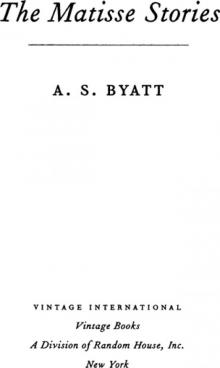 The Matisse Stories
The Matisse Stories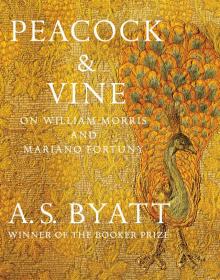 Peacock & Vine: On William Morris and Mariano Fortuny
Peacock & Vine: On William Morris and Mariano Fortuny Elementals: Stories of Fire and Ice
Elementals: Stories of Fire and Ice Sugar and Other Stories
Sugar and Other Stories Possession
Possession Little Black Book of Stories
Little Black Book of Stories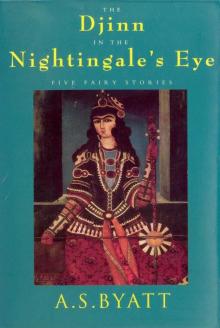 The Djinn in the Nightingale's Eye
The Djinn in the Nightingale's Eye The Virgin in the Garden
The Virgin in the Garden The Game
The Game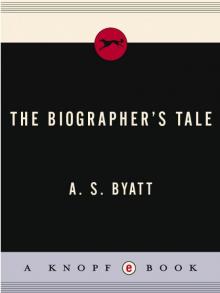 The Biographer's Tale
The Biographer's Tale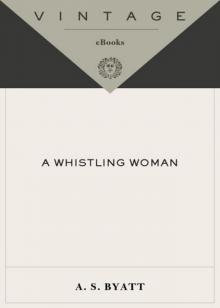 A Whistling Woman
A Whistling Woman Ragnarok
Ragnarok Angels & Insects: Two Novellas
Angels & Insects: Two Novellas Ragnarok: the End of the Gods (Myths)
Ragnarok: the End of the Gods (Myths)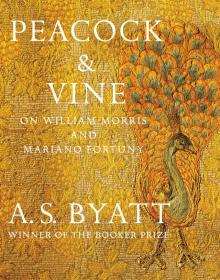 Peacock & Vine
Peacock & Vine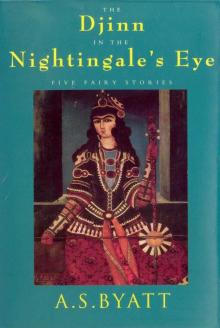 The Djinn in the Nightingale's Eye (Vintage International)
The Djinn in the Nightingale's Eye (Vintage International) Angels and Insects
Angels and Insects The Arabian Nights: Tales from a Thousand and One Nights (Modern Library Classics)
The Arabian Nights: Tales from a Thousand and One Nights (Modern Library Classics) Elementals
Elementals